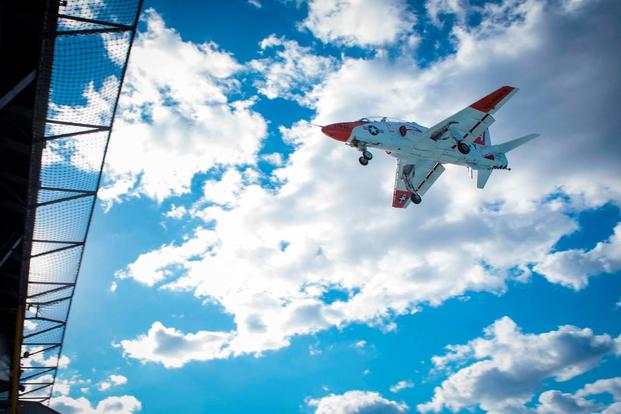Two Navy pilots were killed when a T-45C Goshawk went down in East Tennessee on Sunday evening, officials with Naval Air Training confirmed Monday.
The aircraft, belonging to Training Air Wing One out of Naval Air Station Meridian, Mississippi, went down in the Cherokee National Forest prior to 6 p.m. Sunday.
Naval officials announced late Sunday night that such an aircraft had gone missing, but could not confirm it had crashed.
Just before 10 a.m. Monday, Navy officials with the wing confirmed the tragedy, adding that the lost aircraft belonged to Meridian's Training Squadron Seven.
Related content:
- Navy T-45 Squadron Pauses Operations After Crash Kills Two
- Equipment Guide: T-45 Goshawk
- Navy: T-45 Problems Could Mean Air Force Aircraft Is Needed to Train
The disaster comes roughly a month after the Navy allowed T-45s at the service's three training bases to resume flights with students. The aircraft had been grounded in April after about 100 instructor pilots reportedly refused to fly, citing concerns with aircraft safety after a surge in hypoxia-like cockpit incidents.
The fleet returned to the air the same month with stringent restrictions, including a 5,000-foot altitude limit, but aircraft sorties were limited to instructor currency flights rather than training, according to June congressional testimony from Vice Adm. Paul Grosklags, commander of Naval Air Systems Command.
In late September, leaders of the Navy team investigating physiological episodes confirmed to Military.com that T-45s had resumed training flights in August, but said there had been four pilot physiological episodes since then.
Those episodes, according to Capt. Sara "Clutch" Joyner, the newly appointed head of the Navy's Physiological Episode Action Team, appear to be caused by human factors.
It remains unclear what caused Sunday's deadly crash.
Lt. Elizabeth Feaster, a spokeswoman for Naval Air Training, said an investigation will be launched to determine the cause of the tragedy.
-- Hope Hodge Seck can be reached at hope.seck@military.com. Follow her on Twitter at @HopeSeck.






























